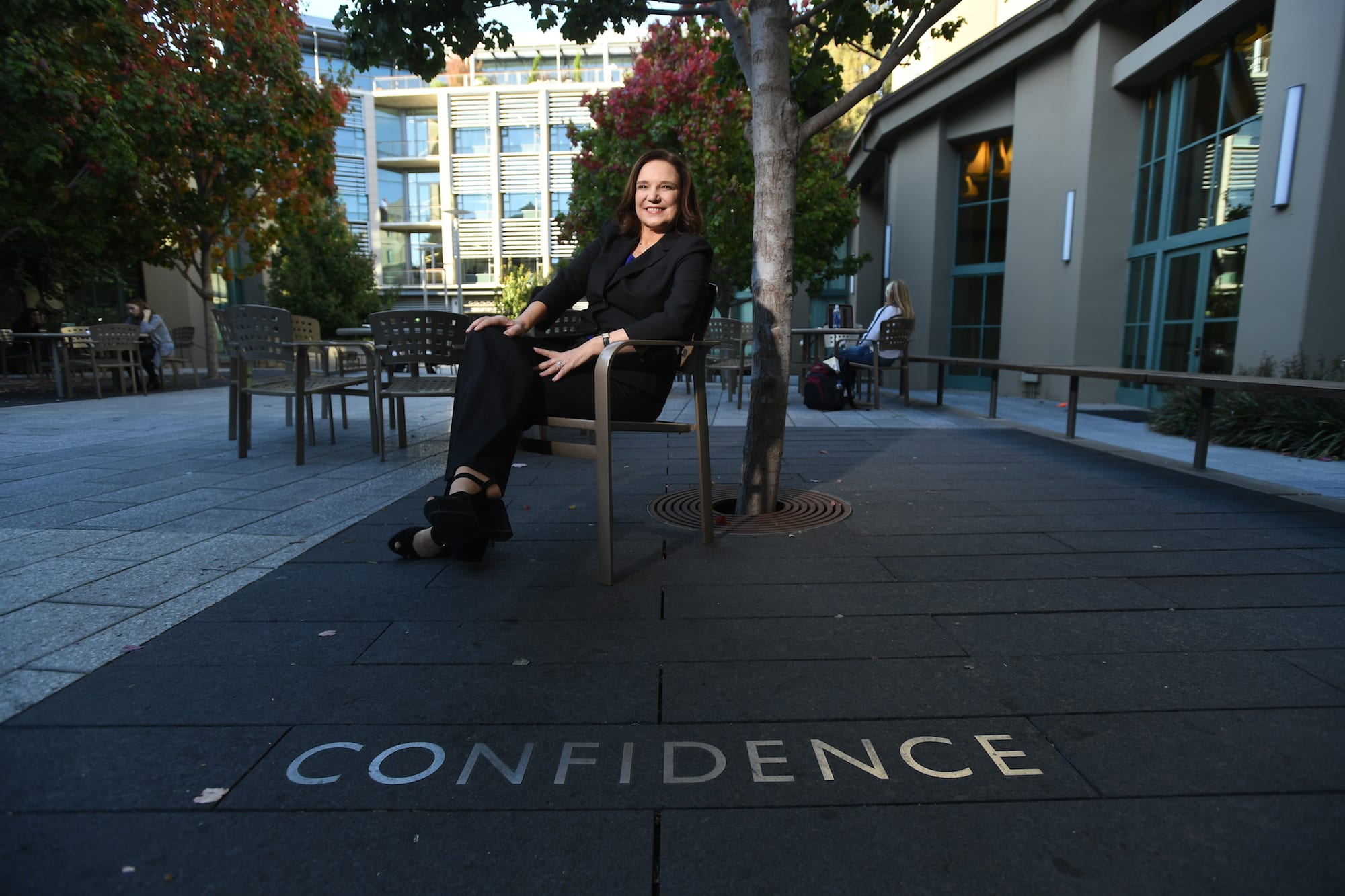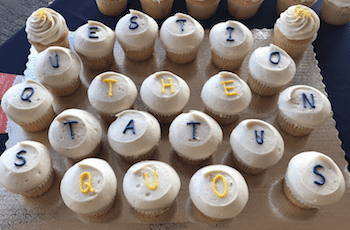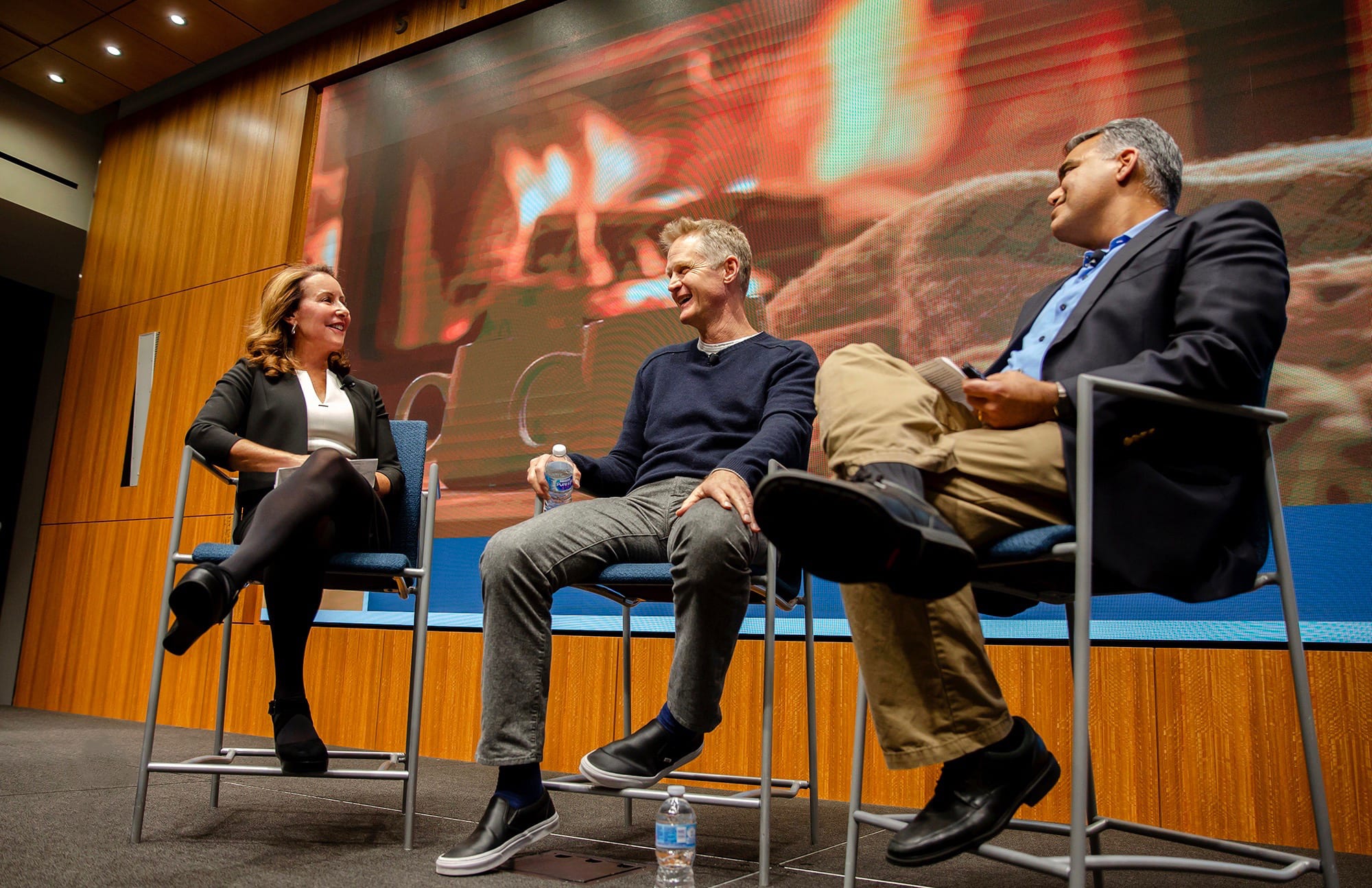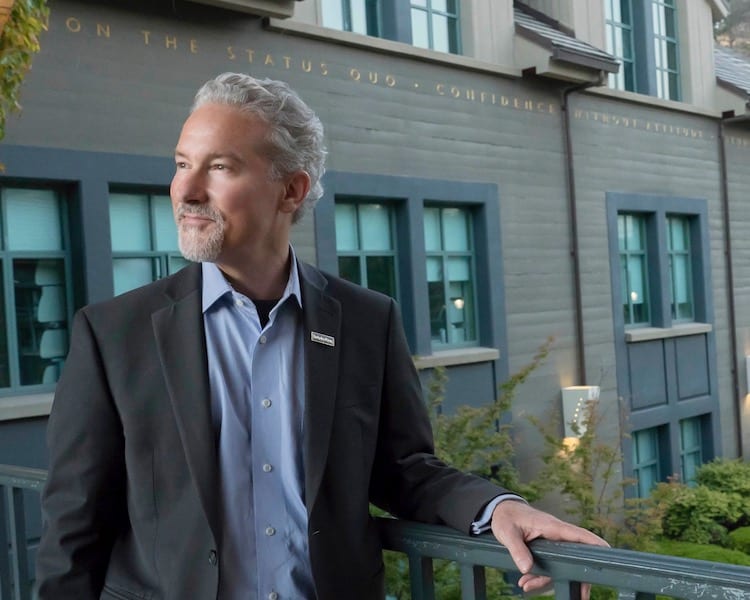
It’s the 10-year anniversary of the Berkeley Haas Defining Leadership Principles: Question the Status Quo, Confidence Without Attitude, Students Always and Beyond Yourself, and Dean Ann Harrison is reflecting on their continued success.
“These principles codify so much of what sets Haas apart,” says Harrison, as she looks out her window at the four principles etched into the building above the entrance to the school. “They’ve grown stronger over the years and are now woven into everything that we do.”
Spearheaded a decade ago by former dean Rich Lyons, the principles put into words the culture that had always been a part of the school. A 2018 Poets & Quants article “Where Culture Really Matters,” noted that the principles have since become a significant symbol of what the school believes and stands for, and that “There is no doubt that Haas stands alone among business schools in consciously defining and shaping a strong culture to its competitive advantage.”

Today, the principles influence everything from how students are selected and staff and faculty are hired, to how the Haas leadership team works together, to how the budget is crafted. Harrison does not miss an opportunity to speak of why the principles are a key reason why she came to Haas. She’ll be celebrating them at events throughout the year.
“So much more than just words”
Harrison says her role as dean relates most to the principle Beyond Yourself. “One of the great aspects of being dean is that it gives me the opportunity to give back to an incredible institution that changes so many student lives for the better,” she says.
For Senior Assistant Dean, Chief Strategy and Operating Officer Courtney Chandler, the principles have become “so much more than just words.” They’re aligned tightly to the school’s strategy and execution.
“Powerful leaders think about culture all the time,” she says. “If done well, everything relates back to the culture, from how we set priorities to how we get buy-in from people to how we show up as a community.”
Chandler says the principles impact how she personally leads at Haas, and play an integral role in how the administration responds to big challenges—such as the drop in African American student enrollment in the MBA program two years ago. “Even with a major initiative like diversity, equity and inclusion, we looked at it through our culture lens,” she says. “Our DLPs helped us to question the status quo and work through this challenge with our community using a student always mindset in a way that we never could have done as well without them.”
Developing leaders
Delphine Sherman, the school’s chief financial officer, cites numerous examples of how the principles guide her in her job. For example, she says that when filling open positions, her department always questions the status quo to find the best possible solution. “Rather than just automatically refilling that role, we ask if there is some way to change the way that work is done,” Sherman says.
Students have also become enthusiastic champions of the principles, which are increasingly embedded in Haas classrooms. Seventy-five percent of students from all three MBA programs and the undergraduate program now cite the DLPs as a strong reason for choosing Haas.
Several years ago, the school began a mapping project to “link and label” ways that core and elective MBA courses connect to the principles, says Jay Stowsky, senior assistant dean for instruction.
For example, in the Haas@Work course, students learned to “influence without authority,” which embodies Confidence Without Attitude. A Brand Strategy Boot Camp taught students to evaluate qualitative and quantitative research and turn that into actionable decisions, which reflects Students Always.
Building a community around culture
On the faculty side, Profs. Jenny Chatman and Sameer Srivistava are making the school an epicenter for culture research through the Berkeley Haas Culture Initiative and an annual conference in January. Their goal is to build a community of academics and practitioners to pioneer new research methods, spark research collaborations, and develop new tools for managing culture as a strategic asset. Chatman has also written two culture cases on the school’s culture and the history of the principles with Lyons.

The first case, which documents the culture’s origin story, is used in many ways to continue to build the culture, including teaching it in Haas classes and providing it to campus recruiters. The case is also used during faculty onboarding. “Tenure-track faculty—especially those who join Haas right after graduating from their PhD program—typically have never been part of an organization that is intentional about culture, so this material is particularly eye-opening for them,” Chatman wrote in the case.
The second case, published last year, asked what the new dean and the school need to do to keep the culture strong and valuable. Among many efforts, Chatman pointed to the Culture Leadership Fund. “Not only did the fund spark many conversations with important constituents, it also surpassed its target, raising just over $230,000 to be used for additional, culture-strengthening,” she says.
“Just getting started”
Many alumni share how the principles have influenced both their work and personal lives over the past 10 years, says Tenny Frost, executive director of development & alumni relations. School surveys have found that more than 90% of alums from the past decade are familiar with the principles and frequently cite them.
“The principles have been incredibly powerful and energizing to our alumni as they feel them deeply,” she says, noting that Haas’ lifelong learning opportunities (offered both online and in-person) support the Student Always principle.
Alumni are also honored for embodying the principles. An example is Constance Moore, MBA 80, a distinguished real estate veteran and volunteer board member for numerous organizations, who recently received a Lifetime Achievement Award.
The award recognizes members of the Berkeley Haas community who embody Haas’ Defining Leadership Principles and who have made a significant impact in their field and through their professional accomplishments. Moore is the eighth person to be given a Lifetime Achievement Award from Haas, and its second female recipient.

Lyons, who is now UC Berkeley’s chief innovation & entrepreneurship officer, says he’s thrilled to mark the 10-year anniversary, but believes that Haas is just getting started. “Ten years is a long time for an organizational change, but it is a drop in the bucket in terms of institutional identity,” he says. “Institutions that are the most intentional about culture evolve over 30, 40, or 50 years, which is what I’d like to see for Haas.”